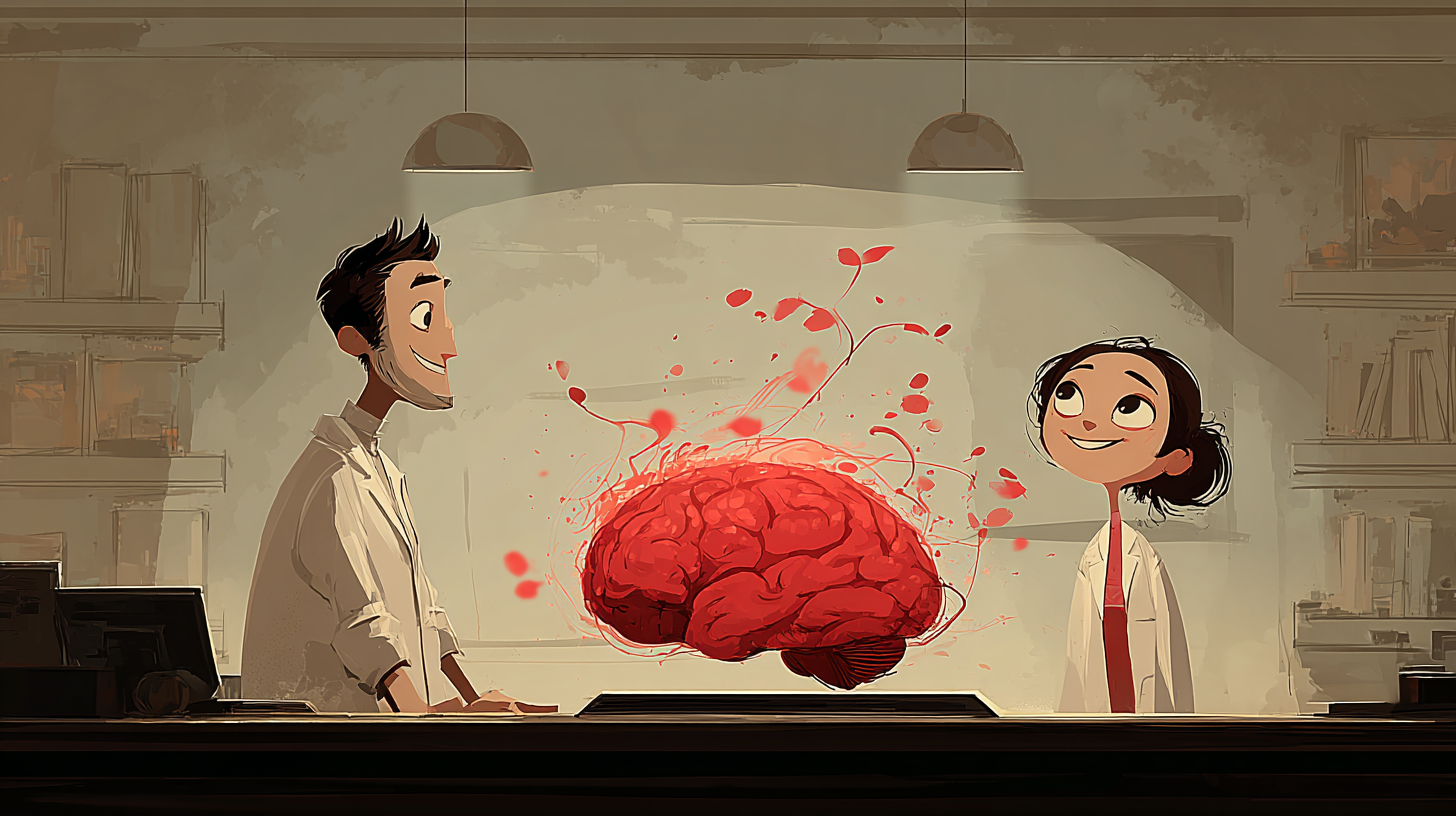“Brain” means the part inside the head that helps people and animals think and remember.
「brain」は「人や動物の頭の中にある、考えたり覚えたりする部分」のこと。
以下は英単語 “brain” に関するストーリー型学習コンテンツです。まずは大枠の意味を理解して最後の文章で確認しましょう。
主な意味(main meaning)
| 品詞 | 意味 | 発音記号 | 英語例文 |
|---|---|---|---|
| 名詞 | 脳、知能、頭がいい人 | /breɪn/ | The human brain controls our thoughts and actions. |
| 名詞 | 頭脳、知性 | /breɪn/ | She is the brain behind the project. |
語源(etymology)
「brain」は古英語「brægen」に由来し、「頭の中の柔らかいもの」という意味から発展しました。核となるイメージは「考えるための中心部」です。
類義語(synonyms)
| 類義語 | 意味 | 例文 |
|---|---|---|
| mind | 心、知性 | He has a sharp mind. |
| intellect | 知性 | Her intellect impressed everyone at the meeting. |
| intelligence | 知能 | Dolphins are known for their high intelligence. |
| genius | 天才 | Einstein was a genius in physics. |
反義語(antonyms)
| 反義語 | 意味 | 例文 |
|---|---|---|
| stupidity | 愚かさ | His stupidity caused many problems. |
| ignorance | 無知 | Ignorance of the law is not an excuse. |
コロケーション(collocations)
| コロケーション | 例文 |
|---|---|
| brain activity | Brain activity increases when you study hard. |
| brain damage | The accident caused brain damage. |
| brain power | Reading books can improve your brain power. |
| brain surgery | He had to undergo brain surgery. |
| brain cells | Alcohol can harm brain cells. |
2項表現(binomials)
| 2項表現 | 例文 |
|---|---|
| brain and body | Exercise helps both brain and body. |
| heart and brain | Decisions often need both heart and brain. |
英語ストーリー(english story)
A Day at the Research Lab
Tom was a young assistant at a small research lab. He admired Dr. Miller, who was the brain behind many successful projects. One morning, Dr. Miller invited Tom to join a new study about brain activity.
“Tom,” Dr. Miller said, “our brain is the most complex part of the human body. It controls everything we do. But many people don’t realize how important brain power is in daily life.”
Tom nodded. He had always thought the brain was just about memory and study, but Dr. Miller explained that even emotions and movements were controlled by brain cells.
During the experiment, they used a special machine to measure brain activity while volunteers solved puzzles. One volunteer, Anna, solved them quickly. Dr. Miller smiled and whispered, “She has a sharp mind and high intelligence.”
However, another volunteer struggled and gave up easily. Tom thought about how ignorance and stupidity could affect people’s choices in life.
At lunchtime, Tom asked Dr. Miller, “What if someone suffers brain damage?”
Dr. Miller answered seriously, “Sometimes, brain surgery can help, but sometimes the damage is permanent. That’s why protecting the brain is so important.”
In the afternoon, Tom and Dr. Miller discussed new ideas. “We need both brain and body to stay healthy,” Dr. Miller said. “Exercise helps the brain stay active too.”
Tom realized that the brain was not just about knowledge, but also about living a full life. He promised himself that he would read more books to strengthen his intellect and also exercise to keep both heart and brain strong.
That day, Tom learned an unforgettable lesson: the brain is the key to understanding the world and improving ourselves.
和訳
研究所での一日
トムは小さな研究所で働く若い助手でした。彼は多くの成功したプロジェクトの「brain(頭脳)」であるミラー博士を尊敬していました。ある朝、博士は新しい研究にトムを招きました。それは「brain activity(脳の活動)」についての研究でした。
「トム、人間のbrain(脳)は体の中で最も複雑な部分なんだ。私たちがするすべてのことをコントロールしている。でも多くの人はbrain power(頭の力)が日常生活でどれほど大切か気づいていない。」
トムはうなずきました。彼はbrain(脳)はただ記憶や勉強のためのものだと思っていましたが、博士は感情や動きまでもがbrain cells(脳細胞)によってコントロールされていると説明しました。
実験では、ボランティアがパズルを解いている間にbrain activity(脳の活動)を計測しました。あるボランティアのアンナはとても早く解きました。博士は「彼女はsharp mind(鋭い頭脳)とhigh intelligence(高い知能)を持っている」と言ってほほえみました。
しかし、別のボランティアは苦戦して簡単にあきらめました。トムはignorance(無知)やstupidity(愚かさ)が人生の選択にどう影響するか考えました。
昼休みにトムは質問しました。「もしbrain damage(脳の損傷)を受けたらどうなるんですか?」
博士は真剣に答えました。「時にはbrain surgery(脳の手術)が助けになることもある。でも時には回復できないこともある。だから脳を守ることがとても大切なんだ。」
午後には、新しいアイデアについて話し合いました。「brain and body(脳と体)の両方が健康であることが必要だ」と博士は言いました。「運動はbrain(脳)を活発に保つ助けにもなるんだ。」
トムはbrain(脳)が知識だけでなく、人生を豊かにすることにも関係していると気づきました。彼はもっと本を読んでintellect(知性)を高め、運動もしてheart and brain(心と脳)の両方を強くしようと決心しました。
その日、トムは忘れられないことを学びました。brain(脳)は世界を理解し、自分を成長させるための鍵だということです。
Q&A
Q: “brain” と “mind” の違いは?
A: “brain” は頭の中の器官そのものを指します。一方、”mind” は「考える力」や「心の働き」を意味し、目に見えない概念です。
Q: “brain” と “intellect” の違いは?
A: “brain” は脳や知能を広く指す一般的な言葉ですが、”intellect” は特に「論理的・理性的に考える力」に焦点を当てます。学問的な場面でよく使われます。
Q: “brain” と “intelligence” の違いは?
A: “brain” は器官や比喩的に頭のいい人を指すのに対し、”intelligence” は「知能・情報を理解する力」という能力そのものを表します。動物の知能にも使われます。
Q: “brain” と “genius” の違いは?
A: “brain” は「知性を持つ人」や「頭のいい人」として使える一方、”genius” は「天才」や「特別な才能を持つ人」を意味します。レベルの違いがあります。
Q: “brain” と “stupidity” の違いは?
A: “brain” は知性や脳を示す肯定的な言葉ですが、”stupidity” は「愚かさ」という否定的な性質を意味します。
Q: “brain” と “ignorance” の違いは?
A: “brain” は知能や脳の働きを表しますが、”ignorance” は「無知」、つまり「知識がない状態」を意味します。必ずしも頭が悪いわけではなく、単に学んでいないことを指す場合もあります。
Q: “brain” と “brain activity” の違いは?
A: “brain” は器官そのものを指し、”brain activity” はその脳の中で起こっている「活動(電気的・神経的な働き)」を意味します。
Q: “brain” と “brain damage” の違いは?
A: “brain” は健康な脳を指しますが、”brain damage” は事故や病気で「脳が損傷した状態」を意味します。
Q: “brain” と “brain power” の違いは?
A: “brain” は脳や知能全般を意味しますが、”brain power” は「脳の働きの強さ」「思考力」を強調した表現です。勉強や仕事の能力を表すときに使われます。
Q: “brain” と “brain surgery” の違いは?
A: “brain” は脳そのものを指しますが、”brain surgery” は「脳の手術」という医療行為を意味します。
Q: “brain” と “brain cells” の違いは?
A: “brain” は脳全体を指しますが、”brain cells” は脳を構成している小さな単位である「脳細胞」を意味します。
Q: “brain” と “brain and body” の違いは?
A: “brain” は脳だけを意味しますが、”brain and body” は「脳と体の両方」を指し、バランスや健康の大切さを表します。
Q: “brain” と “heart and brain” の違いは?
A: “brain” は理性的な判断を意味する一方で、”heart and brain” は「心と脳の両方」、つまり感情と理性のバランスを指します。



コメント